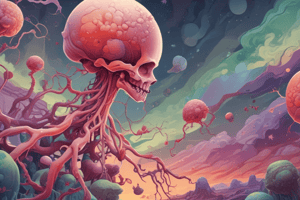Podcast
Questions and Answers
What is the primary goal of inhibiting pro-tumour inflammation?
What is the primary goal of inhibiting pro-tumour inflammation?
- To increase inflammation
- To promote tumour growth
- To enhance immune responses
- To prevent pro-tumourigenic inflammatory signalling (correct)
Dabrafenib is an example of an immune checkpoint therapy.
Dabrafenib is an example of an immune checkpoint therapy.
False (B)
What are immune checkpoints?
What are immune checkpoints?
Regulatory mechanisms that control T cell immune responses.
A red flag in pharmacy practice suggests a possible __________ disease.
A red flag in pharmacy practice suggests a possible __________ disease.
Match the following therapies with their targets:
Match the following therapies with their targets:
Which symptom may transform into a red flag if it persists beyond 4-6 weeks?
Which symptom may transform into a red flag if it persists beyond 4-6 weeks?
Younger patients are always considered at higher risk for developing cancer red flags.
Younger patients are always considered at higher risk for developing cancer red flags.
The presence of a lump in lymph nodes is classified as __________.
The presence of a lump in lymph nodes is classified as __________.
What is the primary role of inflammation in cancer?
What is the primary role of inflammation in cancer?
Chronic inflammation can initiate tumor formation.
Chronic inflammation can initiate tumor formation.
What is the 'two-hit' hypothesis in relation to cancer?
What is the 'two-hit' hypothesis in relation to cancer?
Inflammation can support cancer by promoting _______ of the extracellular matrix (ECM).
Inflammation can support cancer by promoting _______ of the extracellular matrix (ECM).
Match the following inflammatory risk factors with their descriptions:
Match the following inflammatory risk factors with their descriptions:
Which of the following is NOT a method to target inflammation in cancer therapy?
Which of the following is NOT a method to target inflammation in cancer therapy?
Chemotherapy specifically targets cancer cells without affecting normal cells.
Chemotherapy specifically targets cancer cells without affecting normal cells.
What are the two primary aspects of tumor-promoting inflammation?
What are the two primary aspects of tumor-promoting inflammation?
Factors like _______ and _______ can increase inflammatory risk for cancer.
Factors like _______ and _______ can increase inflammatory risk for cancer.
Which cell type plays a critical role in producing factors that support tumor progression?
Which cell type plays a critical role in producing factors that support tumor progression?
Flashcards
Signal Inhibitors
Signal Inhibitors
Targeting specific pathways involved in tumor inflammation to block the signals that promote tumor growth.
Immune Checkpoint Inhibitors
Immune Checkpoint Inhibitors
Immune checkpoint inhibitors are drugs that help the immune system fight cancer by blocking "off switches" on T cells.
Cancer Red Flag
Cancer Red Flag
A persistent symptom that could be indicative of cancer. It requires further investigation to rule out serious conditions.
Duration of Symptoms
Duration of Symptoms
Signup and view all the flashcards
Demographics
Demographics
Signup and view all the flashcards
Clinical Features
Clinical Features
Signup and view all the flashcards
Patient Assessment
Patient Assessment
Signup and view all the flashcards
What makes a cancer cell different?
What makes a cancer cell different?
Signup and view all the flashcards
How does inflammation initiate cancer?
How does inflammation initiate cancer?
Signup and view all the flashcards
How does inflammation support cancer progression?
How does inflammation support cancer progression?
Signup and view all the flashcards
Explain the "two-hit" hypothesis.
Explain the "two-hit" hypothesis.
Signup and view all the flashcards
How can immune cells contribute to tumor growth?
How can immune cells contribute to tumor growth?
Signup and view all the flashcards
How does inflammation contribute to metastasis?
How does inflammation contribute to metastasis?
Signup and view all the flashcards
How does obesity contribute to cancer risk?
How does obesity contribute to cancer risk?
Signup and view all the flashcards
What are the two approaches for targeting inflammation in cancer?
What are the two approaches for targeting inflammation in cancer?
Signup and view all the flashcards
Study Notes
Cancer and Inflammation
- Inflammation is intrinsically linked to cancer.
- Targeting cancer-associated inflammation is a therapeutic approach.
- Understanding the link between cancer, inflammation and symptoms can help identify potential cancer "red flags".
- Knowledge of this link is integrated into clinical practice.
Cancer in the UK
- One in two people will be diagnosed with cancer in their lifetime.
- Cancer survival has doubled since the 1970s.
What Makes a Cancer Cell Different?
- Cancer cells arise from mutations.
- These mutations occur frequently.
- The body is well-equipped to handle these mutations.
What Makes a Cell Cancerous?
- Evasion of apoptosis
- Tissue invasion and metastasis
- Insensitivity to growth inhibitors
- Sustained angiogenesis
- Limitless replicative potential
- Self-sufficiency in growth signals
- An inflammatory microenvironment
Tumour-Promoting Inflammation
- Inflammation supports all aspects of cancer.
- This includes initiation, growth, metastasis and response to therapy.
Inflammation: Cancer Initiation
- Chronic inflammation initiates tumour formation.
- Chronic inflammation causes genetic instability, leading to mutations.
- Chronic inflammation exploits existing mutations (oncogenes).
Inflammation: Tumour Growth
- Immune cells produce factors, supporting all facets of tumour progression.
- Immune cells and tumour cells have a positive feedback loop; encouraging tumour progression.
Inflammation: Metastasis
- Pro-tumourigenic inflammation supports the degradation of the extracellular matrix (ECM) and intravasation.
- Pro-tumourigenic inflammation facilitates pre-metastatic niche formation, attraction to the metastatic site, and subsequent extravasation.
- Inflammation is involved in the growth and development of metastases.
Expanded Hallmarks of Cancer
- Tumor-promoting inflammation as a hallmark of cancer survival.
Anti-tumour Immunity (Inflammation)
- Immunization, antigen processing and antigen uptake are crucial parts of the anti-tumour immune response.
- Cells like dendritic cells and cytotoxic T cells play a key role in recognizing and eliminating tumour antigens.
- Regulatory T cells and immune checkpoints, such as PD-L1, regulate the anti-tumour immune response, aiming to avoid damaging the body’s own healthy cells.
Balance of Pro and Anti-tumour Immunity
- Pro-and anti-tumour immunity is in a delicate balance.
- Tumor cells and inflammatory cells work together in a positive feedback loop maintaining tumour growth
Inflammatory Risk Factors for Cancer
- Obesity.
- Smoking.
- Alcohol consumption.
- Chronic inflammatory diseases.
- Genetics.
Cancer Causation
- Many cancers are preventable.
- Key risk factors include tobacco use, overweight/obesity, diet low in fruits and veggies, low fiber diets, alcohol, inactivity, and infections.
- Prevention strategies like avoiding tobacco, maintaining a healthy weight, and a varied diet are crucial.
Obesity and Cancer
- Obesity can lead to cancer via several pathways.
- These include increased estrogen after menopause, excess insulin and growth factors, and inflammation.
Inflammatory Signalling and Cancer
- Lifestyle factors like high-fat diets, tobacco use, infections, stress, environmental pollution and radiation exposure can lead to inflammation signaling influencing cancer development and progression.
- Inflammation-related biomarkers like cytokines (IL-1, IL-6, IL-8, IL-17, TNF-α, COX-2, 5-LOX, CRP, PSA) and STAT3 activation are associated with different types of cancer and related diseases.
- Chronic diseases like cancer, diabetes, cardiovascular diseases, and pulmonary diseases can be linked to inflammation signaling and certain lifestyle choices.
Inflammation and Cancer
- Inflammation plays a role in different stages of cancer development, from initiation to metastasis and resistance to treatment.
- Inflammation can be both a cause and a consequence of cancer.
Targeting Inflammation for Cancer Therapy
- Two approaches for targeting inflammation are available.
- The first approach is inhibiting pro-tumour inflammation.
- The second approach is promoting anti-tumour inflammation
Targeted Therapies: Inhibiting pro-tumour Inflammation
- Signalling pathways and molecules involved in promoting inflammation are targeted using inhibitors.
- Example: B-raf inhibitors target inflammation-related signal pathways to prevent tumour growth.
Immunotherapy: Promoting Anti-tumour Inflammation
- Immune checkpoints are targeted by drugs, resulting in anti-tumour T-cell-mediated immune responses.
- Examples: Anti-CTLA-4 and Anti-PD-1 therapies.
Cancer Red Flags
- Red flags are symptoms indicative of cancer, prompting immediate medical assessment.
- These symptoms should be considered alongside other risk factors and patient history.
Assessing Cancer Red Flags
- Duration of symptoms is critical for considering them as genuine cancer "red flags."
- Symptoms' severity and longevity, along with other risk factors, guide healthcare decisions.
- Unexplained lumps, bleeding, or mucosal abnormalities are notable and warrant immediate investigation.
Red Flag Symptoms - Examples
- Persistent cough, coughing up blood, recurrent chest infections (Lung cancer), red or white patches in the mouth or neck, unexplained lumps.
Studying That Suits You
Use AI to generate personalized quizzes and flashcards to suit your learning preferences.




